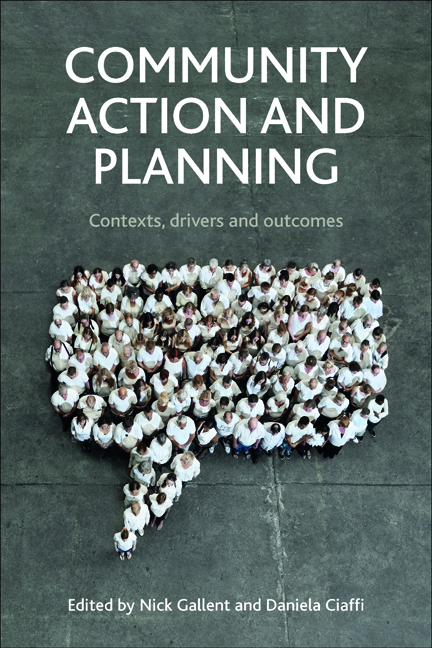1 - Communities, community action and planning
Published online by Cambridge University Press: 04 March 2022
Summary
Introduction
Established models of representative government have come under fire in recent decades, with observers from different countries around the world regularly reporting ‘alienation’ with, and ‘disconnection’ from, traditional political processes. This has happened because societies have changed: they have become more heterogeneous, more complex, and less willing or able to conform to the class orthodoxies (Misztal, 1996; see also Revelli, 2006) that sustained a simple politics of left and right. Indeed, those old divisions have become blurred and new communities have formed across an array of actual and virtual networks, each with its own social and political agenda. Urban and non-urban social movements have gained momentum, especially since the 1970s (Mathieu, 2010). There are new tensions in the world, centred on the prospect of ecological catastrophe and economic meltdown. As a backdrop to the various minor social tremors, and occasional earthquakes, that different countries have experienced, top-down government has become a focus for sustained criticism, largely because of its inability to deliver rapid change and its adherence to the principles of administration (Foucault, 1982) rooted in the assumption that the needs of individuals, and of communities, can be readily categorised and serviced remotely (Habermas, 1984) through a closed and professionalised model of governance. Critiques of established top-down government and over-centralised control – by academics, by political activists, by communities themselves and by a range of other voices – and a growing disenchantment with past political orthodoxies have resulted in broadening enthusiasm for direct community engagement in policy design and in planning, which is sustained beyond local elections. This enthusiasm, and its consequences, has, however, varied between different places with outcomes being coloured by underlying cultural drivers (Ciaffi and Mela, 2011).
In many instances and in response to various triggers, communities simply mobilise. Their trust in the state to solve problems or grasp the opportunities around them, has either been eroded, or they see the virtue and wisdom in doing some things for themselves. In many instances, the local actions taken by community groups and the projects they deliver themselves are hugely successful. Observing this success, governments that have for many years been seeking the means to revitalise parliamentary democracy – or simply find more effective mechanisms for delivering local services – see an opportunity to rebuild their own legitimacy.
- Type
- Chapter
- Information
- Community Action and PlanningContexts, Drivers and Outcomes, pp. 3 - 20Publisher: Bristol University PressPrint publication year: 2014



